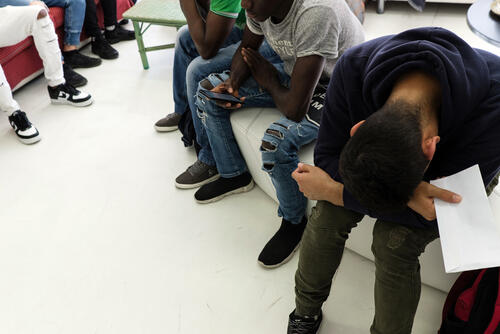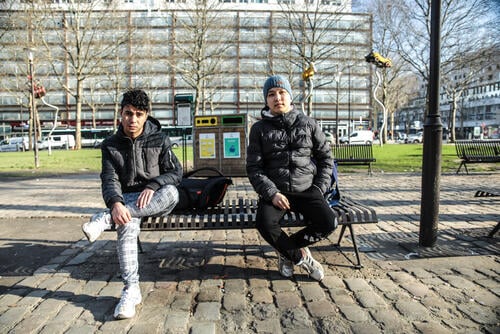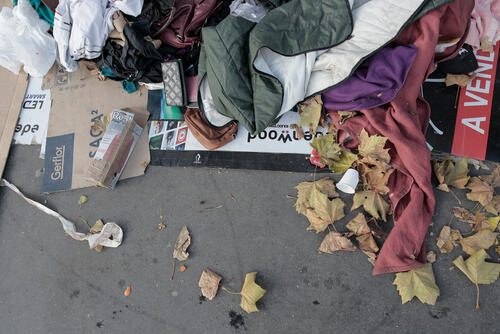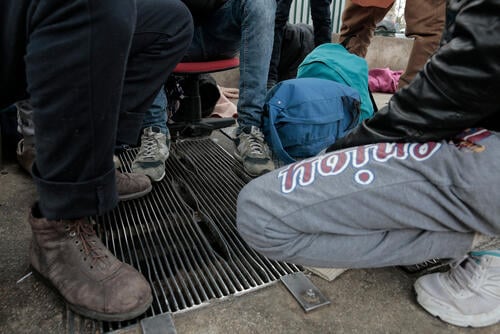Policies designed to dissuade people from migrating are making the journeys of minors arriving in France increasingly dangerous. The distress of those who arrive is exacerbated by abuse and organised institutional rejection. MSF has released a report, Unaccompanied minors: symbols of a policy of mistreatment, which describes the situation.
Read the executive summary and download the report (in French) Unaccompanied minors: symbols of a policy of mistreatment.
Behind the administrative designation “unaccompanied minors” are under 18-year-old children from foreign countries who journey to France without their families. While some leave their home countries voluntarily, the majority have no choice. Although laws and international conventions require France to ensure their protection, in reality very little is done to provide unaccompanied minors with shelter and appropriate care.
Worse still, the French administration imposes deliberately complex administrative procedures calculated to reject them on the basis of an examination of their cases −a system that drives young people into a rootless and precarious existence, while exonerating the authorities of all responsibility.
Source: French Ministry of Justice – Unaccompanied Minors Department
40,000
40,
17,000
17,
A traumatising journey into exile
Unaccompanied minors who arrive in France have undergone long, arduous, and often traumatising journeys, during which violence is commonplace. In addition to the brutality that forced them to leave everything behind in their home countries, they have had to contend with the violence − sometimes extreme − encountered along the road into exile, especially when passing through Libya (captivity, sexual violence, physical abuse, etc.).
Eighty-seven per cent of the young people MSF assisted at our centre in Pantin in 2018 said during medical examinations they had been subjected to violence, torture or abuse during their journeys.
And there’s little respite when they get to France. Left to fend for themselves, in unfamiliar territory and with no money, they are particularly vulnerable. If they don’t want to sleep rough, they have to quickly get to grips with the complexities of France’s administrative procedures to be able to negotiate their way through the system.
Mark, a young Cameroonian in France, speaks about his journey (in French).
Sleeping rough
Providing immediate, appropriate and unconditional accommodation for a minimum of five days is a legal obligation for any minor initiating the assessment process in a département. However, hundreds of teenage migrants say no temporary accommodation is made available to them during the process and that they sleep rough on the streets of France while waiting for the authorities to recognise them as minors.
The young people Médecins Sans Frontières (MSF) teams assist at our Pantin centre are those who have been deemed insufficiently convincing during their minority assessment interviews. The verdict pronounced, despite their claims, the administration does not recognise them as minors. This means they receive no assistance with accommodation, food, medical care or education, which would enable them to survive and also facilitate their integration into society. In 2018, more than half were sleeping rough at the time of their first visit to the centre.
I was hoping to sleep in Gare du Nord train station but lots of people drink alcohol and take drugs there. It’s too scary, so I sleep near the canal in République.An unnacompanied minor in Paris
Their only recourse is to file for an appeal before the courts to try and obtain protection—yet another slow and cumbersome process. Many minors rely on associations and civil society support organisations for their survival as the authorities shirk their obligation to ensure the protection of children, despite the fact that the law stipulates all young people must be considered minors until all legal recourse is exhausted.
After challenging the initial decision in court, many young people succeed in being recognised as minors ─ a woeful reflection of the shortcomings of often arbitrary and cursory assessments conducted by the various départements.
431
431
57 %
57%
Of the 431 unaccompanied minors assisted at the Pantin centre in 2018 who succeeded in filing an appeal before the courts for a review of their application for protection, 57.5% were recognised as minors and placed in the care of Child Protection Services.
An uphill struggle to secure access to health care
For young unaccompanied foreigners, securing access to health care is an uphill struggle. Neither minors nor adults, the care they receive is often both inadequate and sporadic. The administrative procedures that could enable them to benefit from social protection are onerous, even though France is required to ensure access to health care and protection for all minors residing on its territory.
But the State takes no account of the special status of these young people. Given the harrowing conditions and possibly torture they experience during their journeys and that they live out on the street, they not only need medical care but also psychological support.
Of the young people seen by psychologists at MSF’s Pantin centre, 34 per cent suffered from psychotraumatic stress disorders that need immediate treatment to prevent them from becoming irreversible. Treating young, foreign unaccompanied patients is a challenge , as it requires taking account of the extreme instability of their lives. It becomes impossible when they are not placed in the care of Child Protection Services.
The reality is that the care available to unaccompanied minors does not allow them to escape the insecurity of their living conditions, let alone provide them access to health care. Worse still, it appears to be set up in such a way as to dissuade them from claiming the assistance to which they are entitled.






